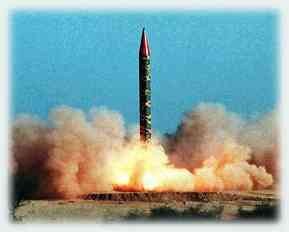
|

|

Jewish World Review / July 27, 1998 / 4 Menachem-Av, 5758
 |
|
Pakistan's 'Ghauri'
missile, launched on April 6, is similar to Iran's Shahab-3, tested on Wednesday. |
When hopes collide with reality
THE OMINOUS NEWS that Iran has a
medium-range missile capable of
hitting both Israel and Saudi Arabia
with nuclear warheads shouldn't
come as any shocker.
A few years ago, I broke a
story in U.S. News & World
Report that rocket scientists
from China, Pakistan,
Russia and North Korea were in
Tehran developing just such a missile.
Another item on both this page and in
U.S. News was that Russia was
building an Iranian nuclear plant
capable of helping the mad mullahs
develop their own nuclear weapon.
I tell you this not to crow, but to point
out a frightening fact. In both
instances, more than a few U.S. and
European intelligence officials
pooh-poohed the reports as
"alarmist." "Not to worry," said one
"expert" in Washington. "Sure, Iran
wants a nuclear weapon and wants to
deliver it. But we think it's mostly
posturing."
That was the same line Pentagon
intelligence delivered in the summer
of 1990, when some of us reported
that Saddam Hussein was massing
troops on Kuwait's border.
"Our best sources here say it's just
Iraqi posturing," one of my
Washington editors messaged me.
Nine months later, when I returned
from covering the Gulf War, I framed
his message.
Now the headlines ask: "What are
Iran's real intentions?" You don't have
to be a rocket scientist to figure it out.
The goals are the same as they've
been since the mullahs took over in
1979: impose their religious
extremism on their neighbors, destroy
Israel, neutralize Iraq and take over
Saudi Arabia — both for its oil and
for its Muslim holy sites. In other
words, control the Mideast.
In the best of worlds, we should have
peaceful relations with Iran. That
hasn't happened. And while its new
president, Mohammad Khatami, is
touted as a moderate, I'm not sure
he's winning the battle against his
extremist rivals. Besides, there's not a
lot of evidence he offers anything very
different. Iran is still a repressive
dictatorship, still funds Mideast
terrorists, still tries to assassinate
exiled dissidents, still builds nuclear
weapons and rockets.
Yet the experts want to believe Iran is
changing. One recent story
breathlessly reported that Khatami
had "graciously" autographed a soccer
ball for a visiting American journalist's
daughters — even though girls are
forbidden to play soccer in Iran. It
reminded me of the classic line in
Mel Brooks' "The Producers." "Very
few people know it," confides a nutty
Nazi, "but the Fuhrer was a terrific
dancer!"
The White House is also grabbing at
straws. The Jewish weekly Forward
recently revealed that in an odious
attempt to curry favor with Tehran,
the administration was trying to
prevent the Flatow family of New
Jersey, whose daughter was murdered
by Iranian-backed terrorists, from
collecting U.S. court judgments
against Iran.
How do we stop Iran? Not by
groveling. If there's anything
preventing Iran from attacking Israel,
for example, it's the knowledge that
Israel has a nuclear arsenal and is
capable of delivering it. Israel's air
force also has the capacity to knock
out whatever nuclear-weapon and
rocket plants Iran has constructed.
If Israel does that now — and I
wouldn't rule it out — the United
Nations and everyone else will
scream about "endangering world
peace."
That's how they reacted in 1981
when the Israelis took out the nuclear
bomb plant Saddam was building.
Can you imagine what the Gulf War
and the Mideast might have become
if they
By Richard Z. Chesnoff
JWR contributor and veteran journalist
Richard Z. Chesnoff is a senior correspondent at US News
And World Report and a columnist at the NY Daily News.
7/22/98: A lesson about peace ...in Auschwitz
7/15/98: What Hitler tried todestroy, the 'Net helped put back together
7/8/98: Love -- and leave -- thy neighbor
4/9/98: The US Navy's two faced Pollard policy
4/2/98: A breakthrough in Lebanon?
3/30/98: Full rights for all Israelis?
2/27/98: America's Schindler
1/30/98: A last chance for the Mideast?
1/11/98: The Moment for Restitution Has Arrived